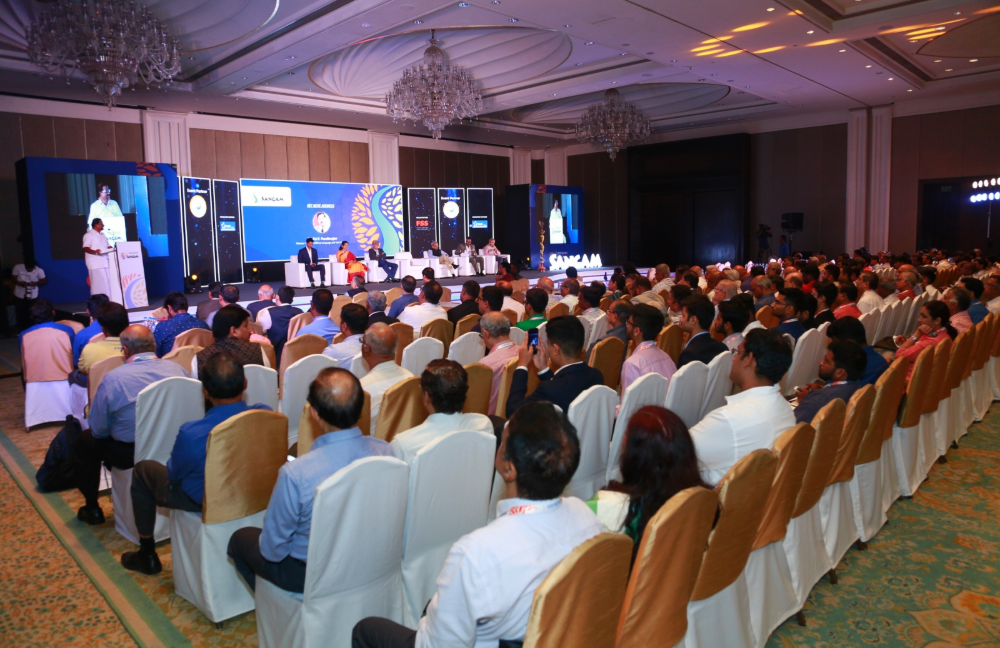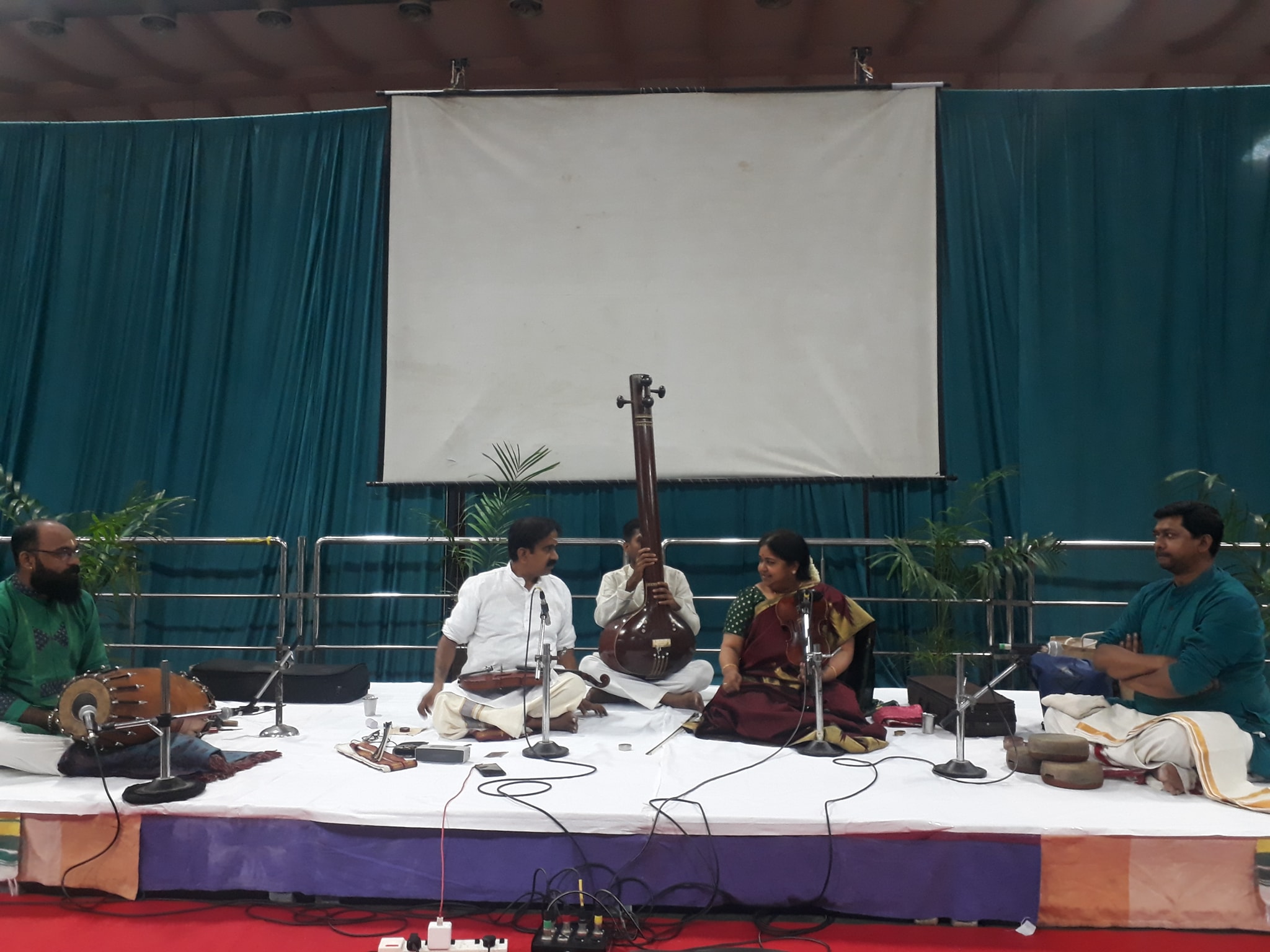This article is a summary of the 2019 IITMAA Sangam Confluence. To view more detailed reports of the panels, you can read the following articles on Agriculture and Sustainable Living, Economy, Business and Technology and Technology for All.
IIT Madras Sangam Confluence is the annual flagship event of the IIT Madras Alumni Association (IITMAA) in association with the Office of International & Alumni Relations.
‘Sangam’, which translates to confluence, symbolizes the event in itself – it is a confluence of alumni with leaders and thinkers of the day to explore the challenges encapsulated by the meet’s theme.
Every year, the IITMAA Sangam Confluence grows in scale and this year was no different. The confluence was hosted on the 14th of September 2019 at The Leela Palace and the atmosphere was worthy for the welcoming of the pride of IIT Madras: its alumni.

The overarching theme for the conference was Reimagining India in 2030. The motivation behind choosing this theme came from the suggestion of late Prof. C.K. Prahalad who emphasised the need for the community to explore ways in which India can assert its economic, technological and moral leadership in the world.
Our Director, Prof. Bhaskar Ramamurti, welcomed the gathering with an inaugural address and emphasised the crucial role that alumni play in setting an example for the society, given how fast the world is evolving. This was followed by an address by Mr. Sriram Viji, Deputy Managing Director of Brakes India and Mr. Krishnan Narayan, Founder of Itihaasa. They shed light on the rationale behind choosing the theme, and the enormous amount of work that went into compiling a report. (The theme, and the talks at the panel were centered around the discussions in the report, which was unveiled at the confluence). The report identified 8 grand challenges, 38 recommendations, and 22 objectives with the overarching theme of Reimagining India in 2030. They had also undertaken a “Mood of the Nation Survey” with 2300+ respondents, 19% of whom were alumni and 38% of whom were women. The main takeaway from the survey was that the nation as a whole is optimistic regarding its future.

The keynote address was delivered by Thiru. Ma Foi K.Pandiarajan. He commended the team for their efforts on compiling the report and emphasized the need to preserve the Indian identity by reinforcing family values and a coherent diversity. He encouraged the role of social scientists and humanities students in the reimagination of India in the coming decade.
Mr. Kris Gopalakrishnan talked about the need to create a sustainable model for developing and pursuing ideas in IIT Madras. He reiterated the importance of research and the crucial need for grants to support world class research. In his opinion, the most important need of the hour is to make technology affordable.
The Fifth Estate correspondents also had a chance to listen to the various panels that were scheduled for the day.
PANEL 1: Panel discussion on Agriculture and Sustainable living
The panel was moderated by Mridula Ramesh, a spokesperson for climate change and author of ‘The Climate Solution’. The panel also hosted several other eminent speakers like T. Krishnakumar, President of Coca Cola India and Southwest Asia, J Karthik, Co-Founder and CEO of Waycool Foods and Products as well as Harish Hande, a Ramon Magsaysay recipient and founder of SELCO India.
The panelists talked about the various initiatives that were being undertaken to solve the pressing issue of agricultural crises. They included Coca Cola’s initiative to recycle bottles and manage plastic waste, and Selco’s Clean Energy Fund which is a social investment vehicle with a target to enhance energy access to the under-served. The panel identified gaps in the policies and came up with various suggestions. The panel also identified that two of the biggest factors that triggered the loss in the agricultural sector are the supply volatility (due to the inaccurate information provided to the farmer regarding demand trends) and inefficiencies in the supply chain. One crucial suggestion was of the need for input from the farmers themselves in the decision making process.
With that the panel was concluded by Mridula Ramesh by highlighting the need to democratise innovation so that it could become a sustainable innovation engine for the world.
PANEL 2: Panel discussion on Global Innovation and Entrepreneurship Ecosystem
The panelists were Swaroop Kittu Kolluri, Founder of Neotribe Ventures, Ravi Narayan CEO of T-Hub, Geetha Manjunath, CEO of Niramai, Tarun Mehta Co-Founder and CEO, Ather Energy. The panel was moderated by Krishnan Narayanan.
The panel, on being asked about their aspirations regarding the entrepreneurship sector for the next decade, answered with making rural-areas more capital intensive, increasing the number of private-public partnerships, and an increase in ‘disruption innovation’.
The panelists reiterated the need for India to take initiatives rather than merely wait for the innovation to trickle down. They emphasised the importance of increasing funding for R&D projects, and the need for a protectionist environment so as to encourage entrepreneurs. Good ‘local business-friendly’ governance is extremely paramount to the success of entrepreneurs in India.
Entrepreneurship finally boils down to innovation, and the panel stressed on the need for an inculcation of creativity in the workforce. It was also discussed that while there exists a view that engineering reigns supreme in the field of entrepreneurship, there is an increasing demand for arts and humanities to be included in the syllabus.
PANEL 3: Panel discussion on Technology for All
As India marches towards becoming a global economic superpower by 2030, one of the pressing issues which need to be addressed is inclusiveness of technology. This panel discussion was based on leveraging technology for all and delivering societal impact. The panel boasted of distinguished speakers from diverse technological backgrounds. The panel was moderated by Prof.Mahesh Panchagnula (Dean I&AR) from IIT Madras.
Santhosh Misra, Commissioner of E Governance – Government of Tamil Nadu, explained how the Government of Tamil Nadu has come up with a cutting edge, zero-cost attendance recognition system, which could be implemented in schools across Tamil Nadu and how this could regulate the status quo, with regard to the attendance system. According to Mrs. Sapna Poti, Vice President, IIT Madras Development Office, the problem is with finding the right problem to solve. “Most people end up spending a major chunk of their precious time on problems which are not-so socially relevant and that, channelising our focus after choosing the right problem statement is paramount.”
Next to speak was Mr. P Anandan, CEO of Wadhwani AI. The Wadhwani Institute for Artificial Intelligence is focussing on developing AI based innovative solutions for the underserved. He gave an example of how they exploited Computer Vision, the same kind of technology which recognises faces, to classify bugs. Dr.S Aravind, Chief Medical Officer of Aravind Eye Hospital, Chennai seconded Mr.Anandan on the impact of technology on the healthcare industry. Stating some recent advancements in health tech, he said that the accuracy of identifying diseases has leapfrogged ever since technology came into the picture.
Panel 4: Panel discussion on Economy, Business and Technology

To discuss the face of India in 2030 in terms of economy, business and technological advancement, Mr Rajiv Lochan (Director, Sundaram Finance), Mr Vellayan Subbiah (Managing Director, TI Cycles) and Mr Ravi Narayan (CEO, T-Hub) were present. The talk was moderated by Mr Krishnan Narayanan, co-founder and president of itihaasa research and digital.
The quality and quantity of youth population of a country plays a major role in determining a country’s development. Although India stands at the top in youth population, we lag behind many countries in Global Innovation indices and development indices relating to societal and economic factors. India not being able to be at par with the world in terms of technological development and acceptance is a major cause of the dichotomy our country is facing currently. Investing in research, enhanced incentives for entrepreneurship, better education for women and employment generation are some fields our country is aggressively trying to achieve over the next decade.
Agriculture is one of the largest contributors to our GDP, but is almost completely overlooked in terms of development. Farmers give in to life-long indebtedness and large-scale wastage of produce owing to unsupervised supply chains. A four-fold model was suggested which invited businesses to invest in agricultural land and provide inputs which enhance the quality of harvest, while receiving a part of the profit in return. The speaker suggested that agriculture does not require artificial intelligence, and can be greatly improved only with careful inspection of supply chains and pro-active investment.
Some other issues that were dealt with included effect of entrepreneurial goals on students’ academic life and condition of the automobile sector in India. It was expressed that entrepreneurship helps students appreciate the relevance of various sciences in the real world, which enhances academic inclinations. It was noted that the automobile sector is making sufficient profits and should be left as it is, considering the transition phase it is going through.
Panel 5: Panel Discussion on “Voice of Women”

This panel was attended by Ms. Geetha Gurappa, Chief Sound Engineer, Real Image; Ms. Jayashree Lakshminarayanan, Production Designer, Art Director ; Ms. Sukirti Gupta – Co-Founder, Sipping Thoughts; Prof. Preeti Aghalayam, Professor, IIT Madras. The panel was moderated by Shylaja Chetlur, Co-Promoter & Creative Director – Art & Soul- Art Gallery.
The panelists started by very briefly introducing themselves and the work they do. However, since the four panels that preceded this one had run longer than expected, this panel discussion had to be cut short. The esteemed speakers on the dias, otherwise, would’ve had an opportunity to delve deeper into the topic.
Finally, the day concluded with the launch of a book, “Muscle to the Mind”.
The panel discussions with the brilliant lineup of speakers made it a rewarding event for all the attendees.




